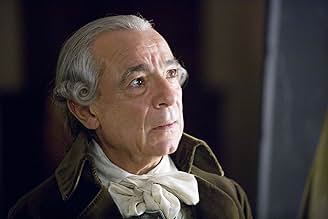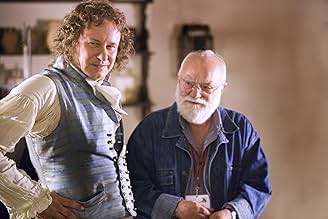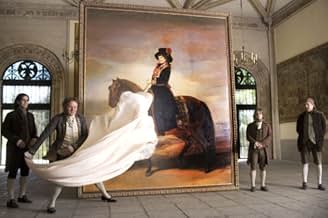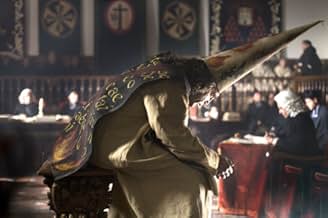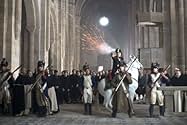Painter Francisco Goya faces a scandal involving his muse, who is labeled a heretic by a monk.Painter Francisco Goya faces a scandal involving his muse, who is labeled a heretic by a monk.Painter Francisco Goya faces a scandal involving his muse, who is labeled a heretic by a monk.
- Director
- Writers
- Stars
- Awards
- 2 wins & 5 nominations total
- Director
- Writers
- All cast & crew
- Production, box office & more at IMDbPro
Featured reviews
The story of the Spanish Inquisition,Napoleanic Wars, a monk and a merchant's daughter and how they affected Francisco Goya.
The movie's plot is complicated,perhaps too complicated, filled with turns and changes its trajectory just when you think it's going one way. You could say that though the story is told from Goya's(Sarsgard) perspective and is primarily advanced by what happens to Ines(Portman) the main character is Lorenzo(Bardem). Its how Lorenzo deals with these situations and how he affects the others that is key. The movie was released a year before No Country For Old Men but Bardem still brings much of the evil and menace he did to Anton Chigurh to this role. However, his role in this film,Lorenzo, is very different and not a deranged killer but more of a scoundrel who carefully picks his tune according to who's in power. Natalie Portman gives a strong performance or performances I should say as she plays two characters. I found this to be distracting as nobody is so identical to their parents but the film is a fictional story.
The film is filled with irony and sardonic moments such as how the Inquistor General sentences Lorenzo to death, then Lorenzo comes to power and orders him to the same fate and ultimately the Inquistor General is restored to power and orders Lorenzo's execution which is carried out successfully this time. Or the ending shot of Lorenzo's dead body being carted off with an insane Ines walking beside carrying an orphaned baby and holding his hand.
The film was written and directed by Milos Forman and not though it isn't of the quality One Flew Over The Cuckoo's Nest or Amadeus it is certainly entertaining and powerful.
The movie's plot is complicated,perhaps too complicated, filled with turns and changes its trajectory just when you think it's going one way. You could say that though the story is told from Goya's(Sarsgard) perspective and is primarily advanced by what happens to Ines(Portman) the main character is Lorenzo(Bardem). Its how Lorenzo deals with these situations and how he affects the others that is key. The movie was released a year before No Country For Old Men but Bardem still brings much of the evil and menace he did to Anton Chigurh to this role. However, his role in this film,Lorenzo, is very different and not a deranged killer but more of a scoundrel who carefully picks his tune according to who's in power. Natalie Portman gives a strong performance or performances I should say as she plays two characters. I found this to be distracting as nobody is so identical to their parents but the film is a fictional story.
The film is filled with irony and sardonic moments such as how the Inquistor General sentences Lorenzo to death, then Lorenzo comes to power and orders him to the same fate and ultimately the Inquistor General is restored to power and orders Lorenzo's execution which is carried out successfully this time. Or the ending shot of Lorenzo's dead body being carted off with an insane Ines walking beside carrying an orphaned baby and holding his hand.
The film was written and directed by Milos Forman and not though it isn't of the quality One Flew Over The Cuckoo's Nest or Amadeus it is certainly entertaining and powerful.
There is one great flaw here that almost everyone mentions... and it's true. The accents of the non-Spanish actors clash terribly with the Spanish ones, as well as with each other. That's a real flaw, but if you can get past that, there's a great film waiting to be seen. I found I forgot all about it after the first 10 minutes. The critics just don't get this film. A lot of regular people seem to miss it too. They want a film with a typical "leading" role. They want their morality tales (which this certainly IS) delivered in easy shades of Black and White... no gray. They don't understand films where the title character is primarily an Observer. Sometimes that CAN be dissatisfying, but here the Observer is a genuine genius. Some people want him to be a moral giant, but he's not, he's simply an observer who has actualized the doctor's oath: First, do no harm. This is a brilliant story, and a morally complex one, too. There are some parallels to America in Iraq, though that is not the primary goal. This story illuminates the folly of any regime, liberal or conservative, as each picks its friends and foes, taking 180 degree turns from whoever was last in power. Javier Bardem gives an incredibly canny performance! Natalie Portman is totally unsentimental and totally committed to her multiple roles: just great! Stellan Skarsgard threw me off at first with the sound of his voice, but builds a performance of power and truth, in spite of it. Randy Quaid was a small revelation. And of course the film looks and sounds spectacular, with it's numerous and detailed textures, compositions and sounds. If you want to think; if you like having pat assumptions challenged; if you love people and history and art: see it!
I read someone else's comment on IMDb (much more adulatory than I would be for Goya's Ghosts), who said that it was a masterpiece not only for Milos Forman and co-writer Jean-Claude Carriere, but for Luis Bunuel too. And that intrigued me even more than I was already in anticipation for the film, merely before as a Forman fan. Upon seeing it I can understand the enthusiasm, and had a kind of private, nearly perverse pleasure in recognizing (maybe too obviously on a subjective level) little things that popped up when Carriere and Bunuel collaborated on some of the late master's best works. On the other hand, for those not too familiar with films like the Phantom of Liberty, the Milky Way or That Obscure Object of Desire, Goya's Ghosts may seem like strong, strange film-making that starts to go a little more haywire after the half-way title card "15 Years Later" (possibly another in-joke for Un Chien Andalou fans) pops up. But it's not only certain things regarding the line between true drama and surrealism that marks Forman's latest as something interesting.
Matter of fact, it is a flawed film, notably in the casting of Stellan Skarsgaard as Goya himself. Why cast a Swedish actor, who usually isn't necessarily bad in the character-actor parts he takes on, in the role of one of the most decadent and ribald *Spanish* artists in the past 250 years of worldwide painting? Skarsgaard doesn't do too much to elevate the part outside of being the guy on the sidelines, dramatically trying to not get too much into the situations, at first, but then soon becoming like a match-maker in the second half when "daughter" drama happens between an ex-"Brother" and an ex-prisoner-of-inquisition. And yet, there is perfect casting in having Barden as the Brother Lorenzo, who doesn't change in how he tries to push aside any of the problems in his life that he doesn't want to deal with, be it questions of real faith, taking care of a certain lost woman, and his illegitimate child, even as he changes from man of the cloth to revolutionary in several years time. Seeing him in the first half in that black robe, his eyes dark and leering of Goya and even the Church to an extent, it's not wonder that he's one of the most sought-out actors of his time. And even better then that, as far as conventions go, he gets the truest kind of arc with his character.
Then there's Natalie Portman who, as probably as something of both an in-joke/reversal of the tactic used in 'Obscure Object' with two actresses playing the same woman, and a sort of disintegration-of-soul aspect that Forman might be after ambivalently, embodies the crushed innocence of repressive religion. Ines is tossed into a prison following a confession- whether true or not is left nicely vague- that she's Jewish following a questioning of what she ate, and left for more than a decade. Seeing her in this section it's clear she's lucid in her presentation of a simple characterization: sweet and naive, then later torn into oblivion by insanity and a near absurd desperation to find the child she birthed while in prison. When she plays the daughter it's a little more flat and pat, as all we see of her is as a 14 year-old (yes, 14 year-old) harlot. This mixed-up matching of actors (plus a few bits with Randy Quaid as a well-played pudgy king) is set to a backdrop of Spain where society is merciless and without much compromise unless the regime changes, which is towards one way (the ultra strict Catholics) or the other (the flawed Napoleon revolution people). Meanwhile, Goya, deaf, sketches away in drawings that today seem right out of graphic novels.
As mentioned, one may get some moments of random surprise as opposed to fully stark costume drama; the first appearance of Portman's daughter played by herself is a little doozy; the way the cardinal tells his choir boy to keep reading the passage even as the French soldier on horseback rides in with a decree, then shoots the boy midway through; the emergence of the British army going towards and swarming around a cart of 15 prostitutes left out in a field; the very last scene, where a cart carrying a dead man is followed by...say no more. So there is a drawback, or more than one at any rate, to Forman going for telling about the nature of the society around Goya than too much about Goya himself. It is a disappointment too to not get entirely, aside from the 'her face haunts me from that painting' logic, as to why Goya is so infatuated with Ines and her plight in the first place. There's not much to be seen into the man who drew such scandalous drawings whilst being the king's painter. What we get instead, which is intriguing and involving, if not totally successful, a story of corruption from the 'Powers-That-Be', and when it strikes at this Forman and Carriere get some good, juicy entertainment.
Matter of fact, it is a flawed film, notably in the casting of Stellan Skarsgaard as Goya himself. Why cast a Swedish actor, who usually isn't necessarily bad in the character-actor parts he takes on, in the role of one of the most decadent and ribald *Spanish* artists in the past 250 years of worldwide painting? Skarsgaard doesn't do too much to elevate the part outside of being the guy on the sidelines, dramatically trying to not get too much into the situations, at first, but then soon becoming like a match-maker in the second half when "daughter" drama happens between an ex-"Brother" and an ex-prisoner-of-inquisition. And yet, there is perfect casting in having Barden as the Brother Lorenzo, who doesn't change in how he tries to push aside any of the problems in his life that he doesn't want to deal with, be it questions of real faith, taking care of a certain lost woman, and his illegitimate child, even as he changes from man of the cloth to revolutionary in several years time. Seeing him in the first half in that black robe, his eyes dark and leering of Goya and even the Church to an extent, it's not wonder that he's one of the most sought-out actors of his time. And even better then that, as far as conventions go, he gets the truest kind of arc with his character.
Then there's Natalie Portman who, as probably as something of both an in-joke/reversal of the tactic used in 'Obscure Object' with two actresses playing the same woman, and a sort of disintegration-of-soul aspect that Forman might be after ambivalently, embodies the crushed innocence of repressive religion. Ines is tossed into a prison following a confession- whether true or not is left nicely vague- that she's Jewish following a questioning of what she ate, and left for more than a decade. Seeing her in this section it's clear she's lucid in her presentation of a simple characterization: sweet and naive, then later torn into oblivion by insanity and a near absurd desperation to find the child she birthed while in prison. When she plays the daughter it's a little more flat and pat, as all we see of her is as a 14 year-old (yes, 14 year-old) harlot. This mixed-up matching of actors (plus a few bits with Randy Quaid as a well-played pudgy king) is set to a backdrop of Spain where society is merciless and without much compromise unless the regime changes, which is towards one way (the ultra strict Catholics) or the other (the flawed Napoleon revolution people). Meanwhile, Goya, deaf, sketches away in drawings that today seem right out of graphic novels.
As mentioned, one may get some moments of random surprise as opposed to fully stark costume drama; the first appearance of Portman's daughter played by herself is a little doozy; the way the cardinal tells his choir boy to keep reading the passage even as the French soldier on horseback rides in with a decree, then shoots the boy midway through; the emergence of the British army going towards and swarming around a cart of 15 prostitutes left out in a field; the very last scene, where a cart carrying a dead man is followed by...say no more. So there is a drawback, or more than one at any rate, to Forman going for telling about the nature of the society around Goya than too much about Goya himself. It is a disappointment too to not get entirely, aside from the 'her face haunts me from that painting' logic, as to why Goya is so infatuated with Ines and her plight in the first place. There's not much to be seen into the man who drew such scandalous drawings whilst being the king's painter. What we get instead, which is intriguing and involving, if not totally successful, a story of corruption from the 'Powers-That-Be', and when it strikes at this Forman and Carriere get some good, juicy entertainment.
I saw it yesterday on film festival. And it was great.
When I was reading the description of the movie, I had some doubts. It seemed it would be yet another film about bad, intolerant catholics and good and democratic atheists. I'm just fed up with that kind of films. But it was not so. In a short - it's a great film with bad description.
What it really is about, is that it doesn't matter what principles one believes in if their life is doesn't match these principles. Both inquisitors and French democrats were capable of same brutality - always, of course, in name of some noble idea - love, freedom, equality... It's not sentimental or pathetic and it doesn't try to tell you what is "the only truth". It simply says that its not principles and ideas that are bad - its people. Characters are very human, with many errors - but, at the same time, each of the characters, even "villains" have moments when you will like them. It is also because the film changes perspective several times, and those who were despots become victims.
Maybe its not the best Forman's film, but it is very good.
When I was reading the description of the movie, I had some doubts. It seemed it would be yet another film about bad, intolerant catholics and good and democratic atheists. I'm just fed up with that kind of films. But it was not so. In a short - it's a great film with bad description.
What it really is about, is that it doesn't matter what principles one believes in if their life is doesn't match these principles. Both inquisitors and French democrats were capable of same brutality - always, of course, in name of some noble idea - love, freedom, equality... It's not sentimental or pathetic and it doesn't try to tell you what is "the only truth". It simply says that its not principles and ideas that are bad - its people. Characters are very human, with many errors - but, at the same time, each of the characters, even "villains" have moments when you will like them. It is also because the film changes perspective several times, and those who were despots become victims.
Maybe its not the best Forman's film, but it is very good.
Imagine the paintings and drawings of Goya in all their darkness and beauty coming to life - this is Milos Forman's masterful film. Goya (and us)witness the folly of the Spanish royal court, the murderous sadistic perversion of the Catholic Church, the cruel inhumane madness of the Napoleonic War, along with the sensuality and beauty of life passing. This is the film's main focus: to let us experience the time and place as if seen through Francisco de Goya's eyes. As expected of a Milos Forman's film, the locales, the customs, and the overall production replicates the Spain of the late 18th century and early 19th century with the exactitude of a court painting. The cast is also excellent. As an Inquisitor turned a Napoleon's officer, Javier Bardem deserves another Oscar nomination. Stellan Skargsdar as usual does a chameleon-like transformation this time into Goya. Natalie Portman elevates herself into a higher realm of acting as the doomed, beautiful Ines. And Randy Quaid steals the screen for a few seconds as the King. Milos Forman again has given us an emotionally- and intellectually-challenging portrait of a dark era and the role of art and artist. Although some of the dramatization is slightly contrived, the film is compelling and moving and its vision lingers as Goya's art.
Did you know
- TriviaWhen asked why a film about such a quintessentially Spanish artist was made in English, the director replied "I don't speak Spanish."
- GoofsWhen Goya unveils the unflattering portrait of the queen, she is deeply offended. Actually, queen Maria Louisa liked that portrait so much that she made Goya the first court painter.
- Quotes
[Bonaparte and Lorenzo are looking at paintings of Maria Luisa]
Joseph Bonaparte: I met her once... don't recall her being quite so ugly though. How did she have so many lovers?
Brother Lorenzo: [smiling] She was the Queen, Your Majesty.
- How long is Goya's Ghosts?Powered by Alexa
Details
Box office
- Budget
- $50,000,000 (estimated)
- Gross US & Canada
- $1,000,626
- Opening weekend US & Canada
- $159,671
- Jul 22, 2007
- Gross worldwide
- $9,448,082
- Runtime
- 1h 53m(113 min)
- Color
- Sound mix
- Aspect ratio
- 1.85 : 1
Contribute to this page
Suggest an edit or add missing content


